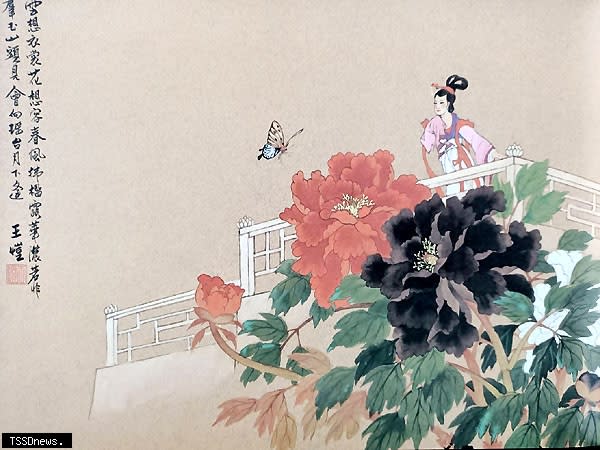A Song of Pure Happiness I
- Poetry of Li Bai (Li Po)

Her robe is a cloud, her face a flower;
Her balcony, glimmering with the bright spring dew,
Is either the tip of earth's Jade Mountain
Or a moon- edged roof of paradise.
Folk-song-styled-verse
This poem illustrates the supposed love story between the emperor and his consort Yang Guifei, one of the Four Beauties of ancient China. According to some historical accounts, the emperor and Yang Guifei would enjoy a nighttime celebration of peony-viewing whenever the peonies were in full bloom. During one celebration, the emperor was displeased with the selection of music and called for Li Bai to write a song. Li Bai, who was supposedly drunk during this time, rapidly composed this poem that pleased the emperor. In praising Yang Guifei’s beauty, Li Bai writes that her clothes resemble billowy clouds, and her blush like the blossoming flowers. The next line describes ordinary aspects of nature — wind and dew — that suddenly attract the attention of Li Bai because of their magnificent wonder; even the simplest aspects of nature become immortalized by Yang Guifei’s presence. The final two lines hint at Yang Guifei’s mystical and goddess-like beauty; because ancient Chinese legend regarded the Jade Mountain as a home for fairies, Li Bai suggests that Yang Guifei’s beauty makes her appear to be a fairy instead of a common human.
云想衣裳花想容,春风拂槛露华浓。
若非群玉山头见,会向瑶台月下逢。
-----------------
雲想衣裳花想容, 春風拂檻露華濃。
若非群玉山頭見, 會向瑤臺月下逢。
- Why Chinese poems is so special?
- The most distinctive features of Chinese poetry are: concision- many poems are only four lines, and few are much longer than eight; ambiguity- number, tense and parts of speech are often undetermined, creating particularly rich interpretative possibilities; and structure- most poems follow quite strict formal patterns which have beauty in themselves as well as highlighting meaningful contrasts.
- How to read a Chinese poem?
- Like an English poem, but more so. Everything is there for a reason, so try to find that reason. Think about all the possible connotations, and be aware of the different possibilities of number and tense. Look for contrasts: within lines, between the lines of each couplet and between successive couplets. Above all, don't worry about what the poet meant- find your meaning.
- Seven Poems on Kaiyuan Era: Dancing Horses
- Midnight Song of the Four Seasons: Summer
- In Reply to Pimei’s Poem Written During Illness
- Ten Odes on Tea Utensils: Tea Vale White Lotus
- Spring Thoughts II
- The Arcane Celadon of Yue Kiln
- Lodging by Riverside Tower
- Along the River for Flowers Alone I
- The Cottage by the Stream
- The Lotus-Gathering Song